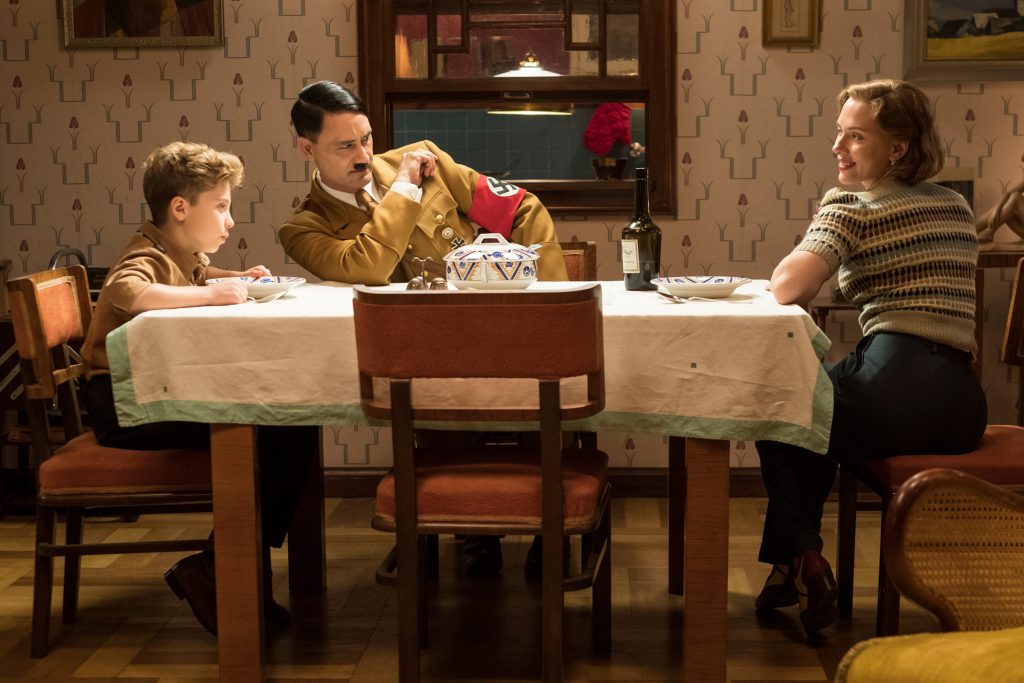You always know you are going to get something unique with a Taika Watiti movie. Although the director is best known for Thor: Ragnarok, the New Zealander made his name with quirky films such as The Hunt for the Wilderpeople and What We Do in the Shadows. Jojo Rabbit is another exercise in that vein of quirky comedy: it’s filled with humor and well-timed jokes, but it also has a lot of heart.
Johannes (Roman Griffin Davies) is a ten year old Nazi-in-training who ends up being sidelined after getting injured in a Hitler Youth summer camp. He finds consolation in his conversations with his imaginary friend, Adolf Hitler (Taika Watiti). His ideology clashes with the beliefs of his mother, Rosie (Scarlett Johansson), who, he later finds out, is hiding a Jewish girl named Elsa (Thomasin McKenzie).
Although the film is adapted from a novel, Chasing Skies by Christine Leunens, its humorous tone is a marked departure from the source material. Like the best protagonists in children’s fiction, Jojo is curious and driven, although the way he has spirited debates about Nazism with his mother and Elsa does leave something to be desired. Yet, as Elsa later states, Jojo is hardly a Nazi: he’s a ten year old who likes to dress up in a funny costume and wants to join a club.

Other than Watiti’s directing and command over tone, the best thing about Jojo Rabbit is its solid cast. Scarlett Johansson stands out as Rosie: she is both fierce and vivacious, and she is an important guiding light in Jojo’s world. Thomasin McKenzie also does well as Elsa, who is full of spunk and dark humor as she verbally spars with the younger Jojo.
Others, like Sam Rockwell, Rebel Wilson and Stephen Merchant, bring a lot of life to their smaller characters; for instance, Rockwell’s character, Captain Klenzendorf, designs an outlandish costume for his last stand against the Allies, while Fraulein Rahm (Rebel Wilson) proudly proclaims that she gave birth to 18 children at one point. Stephen Merchant’s Gestapo officer, Captain Deertz, breaks out into a wide grin when he enters Jojo’s room, admiring all the Nazi propaganda strewn across the walls.“Now, this is my kind of little boy’s room,” he remarks gleefully.
Watiti’s Hitler gets a fair amount of screentime as well, and he behaves more or less you would expect a ten year old’s imagination of a dictator to. He keeps on offering cigarettes to Jojo, which is strange because the real Hitler hated smoking. Watiti has stated that he did zero research for his role because a man like Hitler didn’t deserve that kind of respect. Be that as it may, he does well enough with the role that it’s hard to imagine someone else in his shoes.
Where Jojo Rabbit falters, though, is that it plays too safe at times. This is a very conventional film, which means you can understand when the story takes a very serious turn in the third act as the war draws to its end. However, a braver satire would, perhaps, have stuck to its guns even in the middle of such tragedy. Still, it’s emotional beats are on point: they tug on your heartstrings and makes the eventual, upbeat ending feel more earned.
As it stands, perhaps it’s better to call Jojo Rabbit a dramedy rather than an outright satire. It’s definitely a film worth watching, with both the director and cast bringing their A game to the mix. If you are into heartfelt comedies, don’t miss out on Jojo Rabbit. It won’t just win your heart: it will also surprise you.